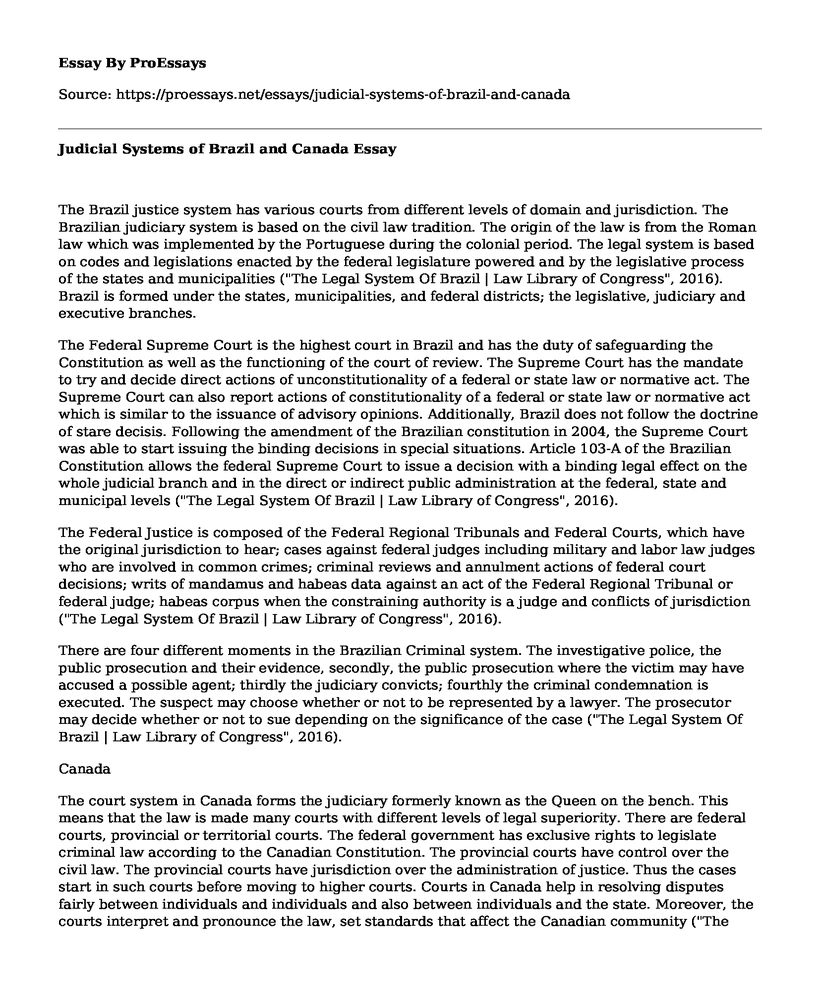The Brazil justice system has various courts from different levels of domain and jurisdiction. The Brazilian judiciary system is based on the civil law tradition. The origin of the law is from the Roman law which was implemented by the Portuguese during the colonial period. The legal system is based on codes and legislations enacted by the federal legislature powered and by the legislative process of the states and municipalities ("The Legal System Of Brazil | Law Library of Congress", 2016). Brazil is formed under the states, municipalities, and federal districts; the legislative, judiciary and executive branches.
The Federal Supreme Court is the highest court in Brazil and has the duty of safeguarding the Constitution as well as the functioning of the court of review. The Supreme Court has the mandate to try and decide direct actions of unconstitutionality of a federal or state law or normative act. The Supreme Court can also report actions of constitutionality of a federal or state law or normative act which is similar to the issuance of advisory opinions. Additionally, Brazil does not follow the doctrine of stare decisis. Following the amendment of the Brazilian constitution in 2004, the Supreme Court was able to start issuing the binding decisions in special situations. Article 103-A of the Brazilian Constitution allows the federal Supreme Court to issue a decision with a binding legal effect on the whole judicial branch and in the direct or indirect public administration at the federal, state and municipal levels ("The Legal System Of Brazil | Law Library of Congress", 2016).
The Federal Justice is composed of the Federal Regional Tribunals and Federal Courts, which have the original jurisdiction to hear; cases against federal judges including military and labor law judges who are involved in common crimes; criminal reviews and annulment actions of federal court decisions; writs of mandamus and habeas data against an act of the Federal Regional Tribunal or federal judge; habeas corpus when the constraining authority is a judge and conflicts of jurisdiction ("The Legal System Of Brazil | Law Library of Congress", 2016).
There are four different moments in the Brazilian Criminal system. The investigative police, the public prosecution and their evidence, secondly, the public prosecution where the victim may have accused a possible agent; thirdly the judiciary convicts; fourthly the criminal condemnation is executed. The suspect may choose whether or not to be represented by a lawyer. The prosecutor may decide whether or not to sue depending on the significance of the case ("The Legal System Of Brazil | Law Library of Congress", 2016).
Canada
The court system in Canada forms the judiciary formerly known as the Queen on the bench. This means that the law is made many courts with different levels of legal superiority. There are federal courts, provincial or territorial courts. The federal government has exclusive rights to legislate criminal law according to the Canadian Constitution. The provincial courts have control over the civil law. The provincial courts have jurisdiction over the administration of justice. Thus the cases start in such courts before moving to higher courts. Courts in Canada help in resolving disputes fairly between individuals and individuals and also between individuals and the state. Moreover, the courts interpret and pronounce the law, set standards that affect the Canadian community ("The Judicial Structure", 2016).
A crime is considered as an offense against the society, thus treated as a criminal. Criminal offenses are set in the Criminal Code of two types; summary convictions offenses which are minor cases such as disturbances; then the indictable offenses which are more serious such as theft and murder. For summary offenses, the provincial court's judge presides over the trials that normally proceed immediately. The penalty for such crimes is usually $5000 fine and six months imprisonment ("The Judicial Structure", 2016).
For the indictable offenses, the accused usually has three choices, which include having a judge alone hear the case in a provincial court; have a judge and jury hear the case in a superior court or have a judge hear the case in a superior court. A preliminary hearing may be heard before the trial, whereby the judge looks ate the case and decides if there is enough evidence to proceed with the trial. If there is no enough evidence, the case id dismissed, but in the case of enough evidence, the judge orders a full trial ("The Judicial Structure", 2016).
When a person is first arrested, the police must first read their rights and tell the person that they have the right to consult a lawyer without delay and then explain the reasons for arresting them and what is the specific charge. The person is then taken to custody in a holding cell, where he or she has a right to appear before a judge within 24 hours. The judge then decides on a pre-trial release or bail. In the bail trial, the prosecutor says why the accused must stay in custody. The judge decides on whether to release with or without condition depending on the strength of the case ("The Judicial Structure", 2016).
References
The Judicial Structure. (2016). Justice.gc.ca. Retrieved 16 August 2016, from http://www.justice.gc.ca/eng/csj-sjc/just/07.html
The Legal System Of Brazil | Law Library of Congress. (2016). Loc.gov. Retrieved 16 August 2016, from https://www.loc.gov/law/help/legal-research-guide/brazil-legal.php
Cite this page
Judicial Systems of Brazil and Canada. (2021, Mar 22). Retrieved from https://proessays.net/essays/judicial-systems-of-brazil-and-canada
If you are the original author of this essay and no longer wish to have it published on the ProEssays website, please click below to request its removal:
- A Discussion on the Tort Law
- Strategies to Achieve Each Goal Essay
- What Aren't You Free to Say? Essay Example
- Essay Sample on U.S. Incarceration: Explaining the Rise in Prison Population
- Essay Example on Drug Abuse in California: Rising Rates & Prevention Efforts
- Paper Example on Chained & Mumbling: Mental Illness in West Africa
- Case Study Sample on Mr. Moore Arrested & Charged Despite No Grounds: Conviction Reversed







